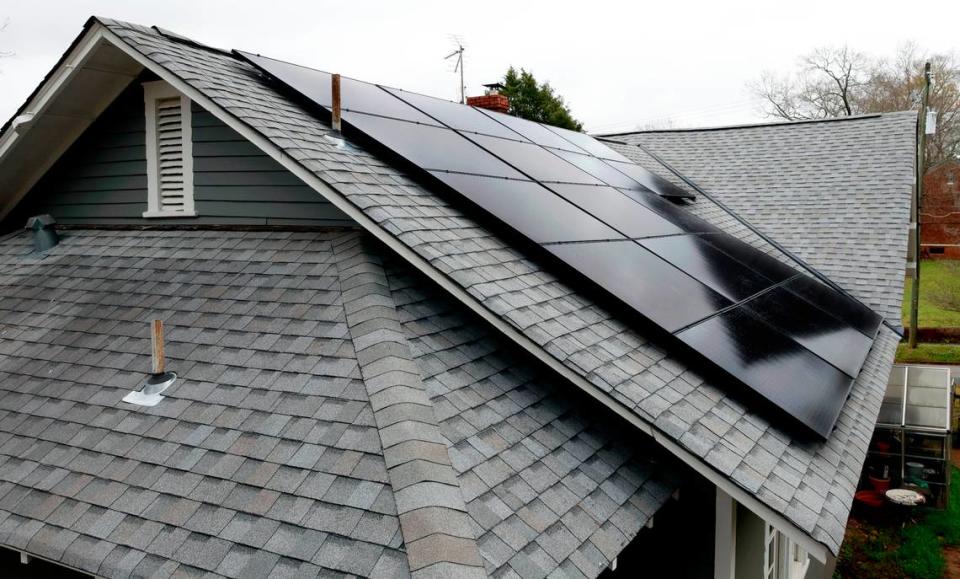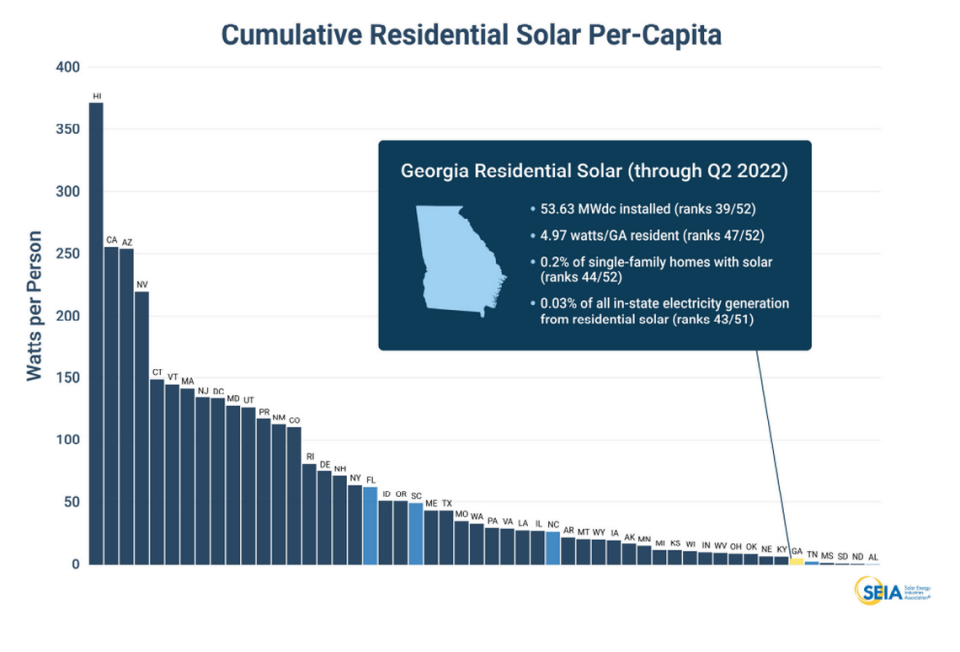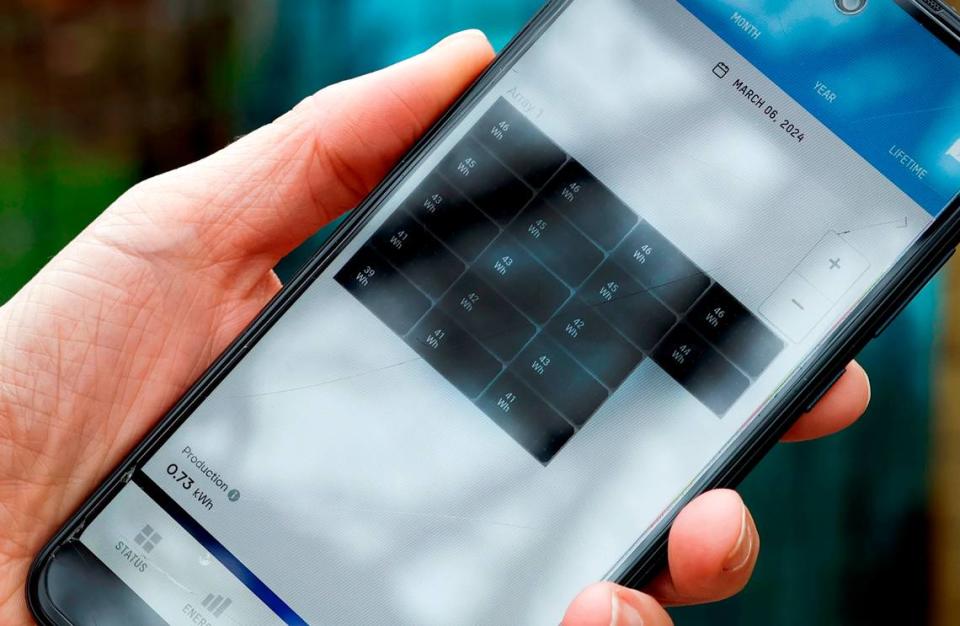Rooftop solar power easier than ever for low-income Georgians. Here’s how to apply
What is the first thing that comes to mind when hearing ‘rooftop solar’? Is it affordable or low-income? Or a seamless and quick process?
Often some families have the upfront investment, time and capital, to sort through permits applications, design, and they end up with solar panels on their roof.
Nearly one month after 17 solar photo voltaic (PV) panels were installed on the southern slope of the roof of Brad Barnes and Jenn Collins’ home in Bibb City, they are excitedly awaiting their first electric bill.
“We paid $279 last month to Georgia Power,” Collins said. “Through this new leasing program we are paying $59 per month for the panels plus whatever electricity we need during the evening, when we aren’t getting power from the panels.”
Barnes and Collins signed up for Georgia BRIGHT (Building Renewable Investing for Green Healthy Thriving communities) in late 2023. Six weeks later they had solar panels on their roof with no upfront cost and with an entire team supporting the efforts along the way.
“We keep telling everyone about this,” Barnes said. “This program made rooftop solar feasible. No money down. And if you sell your house, the new buyer assumes the solar lease.”
The couple is shocked that only one other house in Columbus and 23 houses in the entire state of Georgia have signed up for the Georgia BRIGHT solar program.
There are two basic requirements to qualify for this program: owning your home and making under $100,000 per year in household income. Georgia BRIGHT is the lessor and sets up the homeowner with a 25-year lease at a low 2.09% interest rate.
“By year 25 the lease interest will only be up to $13 more,” Collins said.
Plus, Georgia BRIGHT’s team takes care of any maintenance issues and sets the customer up with an app where they can track usage.
“This really seemed to good to be true,” Collins thought when she applied.

This pilot program created by Capital Good Funds, a nonprofit Community Development Financial Institution based in Rhode Island, manages applications and the three groups that design and install the panel. Capital Good Funds acquired $4 million last October with the aim to set up as many low-income residents with solar in Georgia as possible.
CEO and Founder, Andy Posner estimates that money to be able to fund between 165-200 homes in Georgia.
“This is one of the first ever cases where the nonprofit is the lessor,” Posner said. “We claim the tax credit directly from the IRS, offer lower starting lease payment. It’s thanks to the Inflation Reduction Act.”
Posner chose Georgia as the pilot state because the state is in the top 10 ranking for utility solar, but bottom 10 for residential solar, a “market failure”.

“We are actually serving low-income folks who almost would not get this otherwise,” Posner said. “We wanted to take all of the overwhelm, capital expense, and procurement decisions off the family.”
Brad Barnes told his friend Jim Owen (one of the many people he’s told) about the program. He is now awaiting a stamp of approval from the City of Columbus, one of about four steps to having panels on his roof.
Owen, a retired English professor who taught at Columbus College (now Columbus State University) has lived near Lakebottom Park for 29 years.
“The fact is, in Georgia, the sun beats down on us all the time,” Owen said. “It just makes sense, this is the place for solar panels.”
Owen said the application process was easy and moved fairly quickly. Once confirmed by Georgia BRIGHT, the design and engineering team at Sunpath Solar comes to the house for inspection–-step two after application.
“The people at Sunpath Solar have thought of all the contingencies and are on top of their game, very easy to talk with,” Owen said. “If you try to do this all by yourself it would be very overwhelming. If you apply and are accepted you suddenly have a team of people who know what they are doing and support you the whole way through.”
Gunning uses 3D model designing programs, calculates the best place and angle for solar optimization, reviews energy usage, and inspects the home.
Posner said that historically scam artists who went door to door trying to sucker people, made some skeptical about the concept. Good Fund carefully vetted three companies to support folks the whole way through.
Seth Gunning who leads Sunpath Solar, the engineering, procurement, and design team, was on a zoom call with Owen within a week after being accepted by Georgia BRIGHT.
“I probably would have the panels by now if I hadn’t changed the design a few times,” Owen said.
Gunning said the biggest issue is usually trees blocking the sun. Sometimes it just isn’t feasible, he said.
The other two constraints are old roofs and outdated electrical systems.
“You get a roof and electric inspection for free in this process,” Barnes joked.

Behind-the-scenes Sunpath Solar files for an interconnection agreement with Georgia Power.
“Georgia Power sends an agreement and then has a witness to make sure safety features of the solar work,” Gunning said. “They re-program the meter so it can read power in both directions to apply credits to the bill. Sometimes Georgia Power can take weeks to schedule this.”
Gunning said it’s unclear why it took weeks for Georgia Power and Columbus government to approve Barnes’ home.
“Usually it’s a day or two when we did this in Atlanta or Savannah, the city permit approval comes back pretty quickly,” Gunning said.
The pilot program is set to end April 7. Posner and Gunning are confident that the $250 million EPA Grant, Solar for All competition, which was created by the Inflation Reduction Act’s Greenhouse Gas Reduction Fund (GGRF), will allow another five years of this type of work to continue. Plus the grant may offset costs for roof replacement, which the current pilot does not.
The $250 million Solar for All grant would equate to some 8,000 Georgia homes getting solarized.
“Knowing our grid is pretty stressed, anything an individual can do to conserve or create energy would be helpful both to the greater good and the environment,” Owen said.
